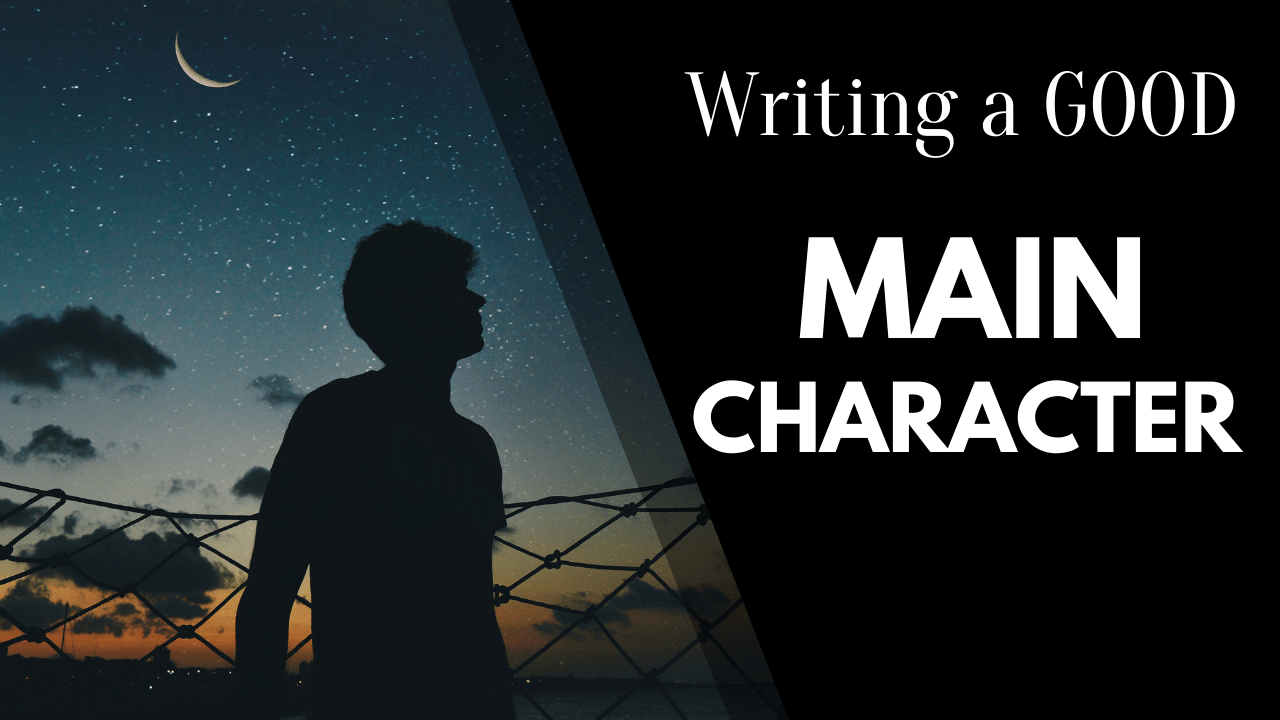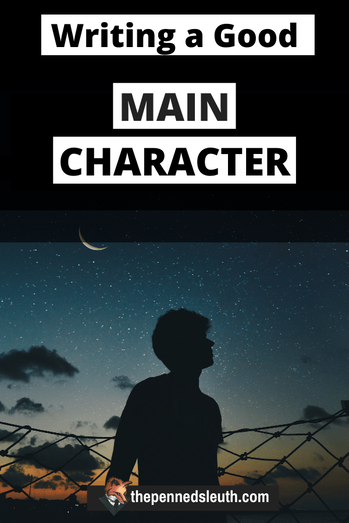Latest Writing Video! |
|
When it comes to writing a good story, it goes without saying that you need a good main character. One that you feel good when writing, one which readers feel good reading. The kind of character that truly fits their role in the story. However, it is so easy to miss the mark and write a character that is alright, but not good. A character which could have been better, a character that could have been memorable. Well, here’s how to make sure you do. Pin for Later!First Time MistakesWhenever I'm writing my own characters always take special care when planning them. The difficulty that many writers have is planning their characters out properly. Now I know what many of you are thinking, you are wondering if it is truly necessary to plan out of character so thoroughly to make them good. The reality of this is that many of you will try to write a character in the first novel as you have it in your mind. Now, this is risky. When you write a character that you have in mind you don't fully understand or think about the applications of the character in your story. What you think about is their personality, their appearance. The way they say things to other characters, perhaps even have some interactions you want to include later in your story. However, writing a character from imagination gives them many vulnerabilities. These vulnerabilities hold the character back and it is often unintentional. For example, when you write a character from imagination you don't think much about their role in the story, as you are to preoccupied with their creation, from their backstory to their likes and dislikes. When it comes to writing a good character you need to truly consider what it is they do in a story; what makes them so important. An experienced writer knows that it is best to create a character for a story, not a story for a character. For example, when I was writing my first book, I was thinking about what I enjoyed about the main characters in books I enjoyed reading. I soon created a list of characteristics that I found will be perfect for the main character. In short, I did do some planning, but again I never really considered what made them good for the story. It is only much later when I was writing the novel that I realised my main character carried too much of the plot. I had built a character in such a way that the story I had in mind shifted with them. The character controlled the world, instead of the world controlling the character. I know that might not sound so bad, but you will find that in most good stories that it is the reactions of a character that makes them interesting. Yet, I had the world reacting to the character, the story bending to their will, in a way. The main character shouldn't be carrying the weight of the story. A character should be fulfilling a part of the story much like a cog in a machine. Of course, I needed to rectify these problems and I went on to do that. I introduced more characters, toned down the importance of the main character a few notches and soon I made something more human, more believable. A more important lesson I want you to take from that experience is that you should not beat yourself up on the mistakes you make in your first novel. Even now, I realise many mistakes I made even in my corrections, leaving me a little peeved that the book is published. Despite all this talk about the importance of the story being greater than the importance of the main character, I cannot stress enough that the main character is still very important. The main character is a 9 out of 10 on the importance scale, story a full 10. Now, I want you to take those numbers with a grain of salt, you still got to approach every little aspect of your novel with the same energy. Now, my second main character. The second book, I decided to change things up and obviously start with the story before I started the main character, I then realised straightaway that my main character is not gonna be having other characters to depend on, so I needed to think about that as well. It became much easier for me to create a character than in my previous book I was simply creating a character and story around them rather than a story and then a character It was much easier to write that novel with that mental shift in mind. A Good FriendYou need to know your main character well as if they were a good friend. Yes, you may not be so fond of the character that fits your story, but you still don’t say no when they want to share a coffee with you and discuss life. You know their fears, you know their passions. You did more than draw up this character, you raised them with your imagination, you developed them with your words. You are their creator, someone who knows them better than any other. Don’t be afraid of taking the time to know them better. One piece of advice I’ve given a writer in my Writer’s Workshop underlines this. We were discussing a character and the way they would sit in a chair. What do you see if they sit across from you? Are they leaning on the table? Are they slumped, casual or sitting-up straight? What’s their preferred hand? How do they look at you? What are they thinking of you? A small experiment you can use with any of your characters. Allow me to make up an example on the spot. I want to write a strong, intelligent villain. We are now sitting in a café, sitting across from each other. Their build isn’t much, but the way they carry themselves says it all. Smart, clean, but their hair lacks any style. The villain is relaxed, yet calculating. Almost as if waiting for something entirely expected to happen. It’s this confidence, this interpretation of their facial muscles and the way they stare at me that I know they have thought a lot on how this meeting would go. The character’s confidence is off-putting, unnerving. It leaves me wondering what they are up to if anything all? Suddenly, I realise I am in the middle of some head game of their concoction. I know at the back of my mind that if I were anyone else in this position, it would be better to do something unexpected, something crazy. To leave the café in an unusual way, to circumnavigate any plan they might have for me. However, I don’t have this worry, as I am their good friend. I know they smoke from their smell, I know they are physically capable, I know that despite their cold mentality, they have a fondness for sugary things, hence the whipped-cream monstrosity of a coffee in front of them. An interesting aspect of their personality, but I know that appearance doesn’t matter to them beyond general cleanliness. I know this character is constantly studying people close to them, looking for weakness, checking if they a threat or not. The villain will position themselves in their seat depending on their confidence. If they are ready to make a run for it, I should be as well. In short, I know a lot and I am glad I’m not their enemy. Of course, this isn’t your character. Your character will have different mannerisms, different ways of thinking. Instead of being cold, careful and calculating, they might be relaxed, happy and fun to be around. However, I want you to take the time to think about this scenario, use your best deductive reasoning to develop your character. The more complex your story, the better you should know your character. Story and Character DualityWell, we have covered some basic mistakes and discussed a method for developing characters quickly. We have talked about the importance of the main character fulfilling a role, but not much. We need now to address this lack of information! When you planned your story, you no doubt covered the many scenes involving the main character. The chapters over plot development, perhaps your story includes a final confrontation or resolution of a problem, perhaps none of these. Yet, your main character was there nonetheless. A silhouette, a place holder under the name of ‘main character’ and no more. At this point, you have that character, you need now write them in such a way that they make the right reactions. Your story should help with this if it doesn’t expressly control it. For example, your main character might seek revenge because the story guided something to wrong them. Your main character might seek justice because your story has presented an opportunity for the main character to combat what they are against. Your main character is motivated by something, but it is your story that has introduced it. Why, when you look at your plot, does the main character do what they do? Try to sum it up in a sentence, simplify it. Worry about the details once you have pegged this core reason. If your main character is the traditional hero, help them fit that role. If it means adjusting their personality, their upbringing, any defining trait, then you must change them. Let’s go over an example: A historically based fiction, some order of knights, a medieval time period etc. A knight meets someone in the street, they become fast friends. The next day, while patrolling the market district, knight sees the man he met yesterday fight off an assailant to the point where the man kills his attacker. The attacker was a drunk noble, an important person to the knight’s order. Our knight is now conflicted. Morally, the knight feels the man he met is an innocent who was simply defending himself. Yet, his code of honour requires him to punish those who harm someone a part of the house his order protects. It’s quite a conundrum and one I can run with to create an entire twisting story from. An inciting incident. Yet, I will change my character to suit the story I want. I could make my knight cold and stay with the order, to be tormented by the memory of this man. Or, I could make them impulsive and empathetic, choosing to leave the order and become a knight who protects all. You need to give your character a suitable motive to pursue your story, sometimes this means changing some aspect of your character, but it is the right way to go. You cannot simply force your character onto a path they normally wouldn’t go. Do this and you will have story-character duality. It will make sense both with your character and your story, it will work as a novel. A Good ConclusionThat brings us to the end of the second article in this series on writing a good book. The main character was destined to be the second, for reasons you now know. Now, while I encourage all writers to place the story above the character, I do understand that there may be exceptions. With some novels, the story is less broad. You might not have an entire world to work with or even an array of different characters. Sometimes, the story is the character and their development over a series of events. These are stories that tend to tackle human nature, emotions and the meaning of life. It’s a form of literature that is often interesting and powerful, but the story itself is quite simple, or not much at all. These still make for great literature, but to discuss these pieces we will need to be truly analytical, understanding of the human psyche and it’s reactions to certain scenarios. We would need to take into account different mindsets, emotional and mental obstacles. At that point, we would be writing the story before we have a chance to discuss it. However, that might make for an interesting series at a later date. For now, I hope you enjoyed this piece on writing a good main character. I would like to remind my readers that I have a writer’s workshop open to those who seek courses or coaching with their writing. If you want professional guidance, be sure to check it out! Thank you for reading and as always… Good day, goodnight and happy writing!
0 Comments
Leave a Reply. |







